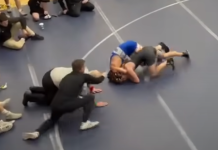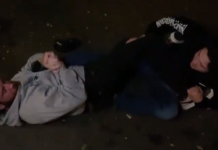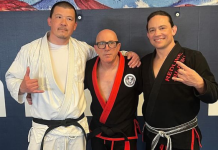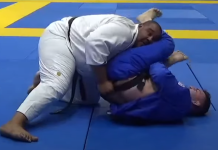Sergio Esquivel has served his country for twenty years, runs a non-profit which helps forgotten or abused children, and has three kids waiting for him at home when he finishes a full day of work. But the word “altruism” trips him up.
“Oh man,” he considers over the phone from Hawaii, where he’s currently stationed. “I don’t know if I’m comfortable with that label. My [wife and I] just want to help people. It’s how we are I guess?”
A United State Marine since June 1999 and jiu-jitsu brown belt with a mixed martial arts background, Esquivel is the founder and driving force behind Cauliflower Collective. The organization uses grappling and jiu-jitsu to help socialize, strengthen, and bring a sense of family to the largely overlooked population of children who have ended up in the country’s purgatorial foster care system.
“These kids have attachment issues, and they don’t have positive role models that are sustainable,” Esquivel says of the youth his organization works with. “I know kids that were in and out of eight homes before age five. They’ve never known consistency. They’ve had no social development, don’t know how to be part of a team, because they’ve never had access to one. They struggle in school, struggle to make friends. With BJJ they learn about role models and resilience. It’s something that can truly help them.”
Esquivel has first hand experience with that transformation. He and his wife, a social worker, currently foster two children and have legally adopted another.
“When we first started fostering I got my son into BJJ and immediately saw the benefits,” recalls Esquivel. “It changed his behavior at home and at school. A lot of people don’t fully understand how isolating the system is, what these kids have been through.”
What they have been through is often horrifying. The majority of children in the welfare system have been removed from their homes due to substantiated physical abuse, sexual abuse, or outright neglect, all of which have lingering physical and traumatic aftershocks. Approximately 1200 children enter the system every day, and not all are “safe” once placed in a foster home. Numbers vary from state to state and population, but it is suspected that roughly thirty percent of all foster children experience some level of neglect or abuse while awaiting adoption in foster care, usually at the hands of foster parents or displaced siblings. And while eighty percent of foster children exhibit emotional and behavioral delays, Cauliflower Collective points out they seldom receive the consistent counseling needed to heal their trauma and bodies. It’s a recipe for a grim future dominated by mental illness, learning disabilities, and an inability to assimilate into any community.
Which is where Esquivel’s collective steps in with documented success stories. Sometimes he sees students failing out of school blossom with structure and discipline, going on to thrive academically. He’s seen behavioral issues like aggression resolve. But the cases where children subjected “to stressors no adult could handle” rediscover they’re actually children bring Esquivel particular joy.
“Two brothers came in once,” the brown belt remembers. “The younger brother had [Traumatic Brain Injury] because his biological dad shook him to the point of serious injuries. He had difficulty speaking or walking, his overall intellectual capacity was effected. And because of this he’d never been picked for any team. He was seven years old, and they’d go out for [recess] at school and he’s not getting picked. He didn’t know what it was like to have friends.”
Cauliflower Collective changed that for the young boy.
“We didn’t segregate him [in training]. There was no ‘special class.’ When he came to train he got to be a regular kid held to the same standards as regular kids. We paid for him to compete at US Grappling, and he did phenomenal…didn’t win the match, but he went out there and had fun and got to compete in a sport and we all cheered for him. He was ecstatic. His smile was so amazing. That was worth it.”
PUTTING HIS NECK OUT
Esquivel is so passionate about expanding Cauliflower Collective’s ability to help the tens of thousands of children in the the system that he’ll do just about anything, including stepping into the ring to literally fight for awareness. The brown belt competes as part of Fight 2 Win’s Hawaii installation this coming weekend, February 2nd, repping CC and Team Gracie Kailua in Honolulu.
The match is well-deserved for a serious devotee and longtime practitioner of the art like Esquivel, though it wasn’t something he aspired to. Sergio originally contacted Fight 2 Win hoping for assistance with awareness.
“I was thinking they’d maybe just put our logo on some fliers or something,” he says, but with the urging of friends and the enthusiasm of F2W honcho Seth Daniels Esquivel ended up on the bill instead. “I have three kids, a wife, a full-time job, a non-profit, you know, a lot of things compete for my time! Training for a fight wasn’t originally on my calendar.” But don’t get it twiste–he’s been making time ever since the match was confirmed.
“When we’re younger both in age and in jiu-jitsu we focus on tangibles. Now that I’m older I’m focused on development, and this fight is already a win in that area for me—Cauliflower Collective is going to gain awareness, and my BJJ has already improved as a result of preparing so that’s mission accomplished.”
Which isn’t to say he doesn’t care about winning. (United States Marine and whatnot.)
“I do care about winning, just in a big picture way!” he laughs. “My kids are going to see me take on the stress and adversity, they’re going to see me not give up, they’re going to see me accept challenges and not cherry-pick opponents. I want them to have those lessons. It’s good for them to see dad get beat up.”
You can watch or attend Sergio’s fight by ordering the event here.
HOW YOU CAN HELP CAULIFLOWER COLLECTIVE
He may not be comfortable with the “altruism” label, but one thing Esquivel’s years of military and martial arts training have made him is adaptable. As a result, Cauliflower Collective is one of the easiest good causes in the fight community to help, even if you are flat broke.
“We can’t all give money. Every non-profit wants and deserves it,” he says. “But with us if you want to help, please devote your time and resources locally—if you have a skill set then volunteer to do a Cauliflower Collective class for these kids in your city. Reach out to me directly and ask how you can help without having to contribute money. If I’m not with my family I will stop what I’m doing to answer help you.”
Gym owner, managers, coaches, high belts, or parents: He’s serious. You can reach out to him directly at (361) 446-5639 or message him here.
And there’s a particular need for the jiu-jitsu community to step up and help this April. CC is aiming to help as many children who have been effected by domestic violence as they can that month, and help with awareness is needed literally anywhere.
“April is Child Abuse Awareness month,” explains Esquivel. “While we absolutely need to focus on victims of domestic violence, we also need to remember the child who was witness to that violence. I would really like to talk to academies about awareness events.”
You can also assist with the efforts by contacting social workers in your area (Sergio will help you) and simply inviting foster kids and their families to kid-friendly events or seminars and waiving their participation fee.
“They do not get these invitations otherwise, and that’s a lonely life for a kid,” Esquivel says. “The truth is most of these kids don’t get what they really need. I think we can close that gap. We can show them that there are opportunities.”






















